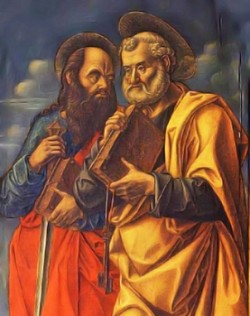
“The aim of the Church’s mission is a humanity that has itself become a living glorification of God, the true worship that God expects: this is the profound meaning of catholicity…
Like Paul, Peter also came to Rome, the city that was the place of convergence of all peoples and which precisely because of this could become the first of all expressions of the universality of the Gospel. Undertaking the journey from Jerusalem to Rome, Peter surely felt himself guided by the voices of the prophets, by the faith and by the prayer of Israel…
The great psalm of the Passion, Psalm 22, whose first verse “My God, my God, why hast thou forsaken me?” Jesus pronounced on the cross ended with the vision: “All the ends of the earth shall remember and turn to the Lord; and all the families of the nations shall worship before him” (Ps 22:28). When Peter and Paul came to Rome the Lord, who invoked that psalm on the cross, was risen. This victory of God would now have to be proclaimed to all peoples, thus fulfilling the promise with which the psalm concluded…
The unity of men in their multiplicity became possible because God, this one God of heaven and earth, showed himself to us; because the essential truth of our life, of our “from where?” and “to where?”, became visible when he showed himself to us and in Jesus Christ made us see his face, himself. This truth of the essence of our being, of our living and our dying, truth that by God was made visible, unites us and makes us become brothers. Catholicity and unity go together. And unity has a content: the fait that the Apostles transmitted to us on behalf of Christ.”